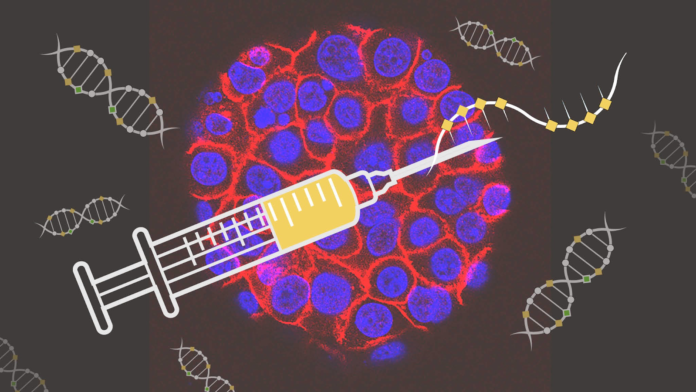Moderna has presented preliminary data from a Phase 2 trial of a cancer vaccine in combination with Keytruda to treat patients with stage 3-4 melanoma (a type of skin cancer) after surgery to remove the tumor. How will this affect the company’s stock?
Traders Tip: Use exponential moving averages on the chart with periods of 10 and 20 (10 EMA and 20 EMA). For example, if the price is well above these moving averages, avoid buying regardless of the strength of the signal. Once the price returns to its average and moving averages, then you may look for entry points.
How the Vaccine Works
Training the immune system to recognize and destroy cancer cells based on each patient’s individual genetic variation, creates a personal cancer vaccine (mRNA-4157/V940). 157 people took part in the study: 100 of them took the combination of the vaccine from Moderna + Keytruda, and 57 took Keytruda alone.
The study found that the drug combination reduced the risk of disease recurrence and mortality by 44% compared to taking Keytruda alone. Serious side effects were reported in 14% of patients in the combo and 10% in the Keytruda. Full trial data will be presented at future medical oncology conferences (tentatively in Q1 2023). The company plans to begin a Phase III trial on the drug in 2023.
Market Potential
A total of about 90,000 cases of melanoma are recorded in the U.S. each year. However, only 5,000 patients fit the criteria for treatment with the drug. Peak sales could be in the range of $500-600 million worldwide, but even if successful, the drug will not hit the market until 2026, which does not solve the issue of revenue diversification.
If the full data show exceptional efficacy of the drug, there is a possibility of approval based on phase 2 trials, but we do not count on that. The company also plans to test the combination for other forms of cancer, among which non-small cell lung cancer is the most common ($5 billion potential market estimate).
What this means for Moderna stock
Moderna is now fully focused on the COVID-19 vaccine. But there is a lot of uncertainty in the future dynamics of the coronavirus, so the key to the company’s investment case is the issue of revenue diversification into other areas. The data on the cancer vaccine is certainly positive. But the drug, if eventually approved, won’t hit the market anytime soon.
Near-term drivers could be data on seasonal flu vaccines in Q1 2023 and ODS in winter 2023. Also, we expect any action from the company to use its $17 billion cash position.
Consequently, we reiterate our “Hold” recommendation and raise our target price from $175 to $199 (1% upside). The valuation includes sales of the anti-cancer melanoma vaccine weighted by the probability of approval, and an update to the outlook for other operating metrics based on the company’s latest filings.








